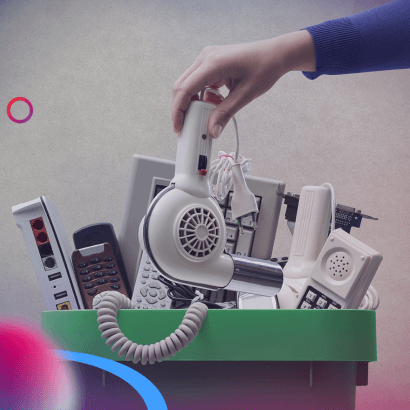Quick and easy tips to dispose of your e-waste

Do you have old electronic devices gathering dust at home that you don’t know what to do with? In this blog post, we’ll provide tips on how you can safely dispose of your e-waste.
What is e-waste?
Electronic waste, or e-waste, is a generic term that refers to obsolete or discarded electrical and electronic products.
What’s the fuss anyway?
Disposing of your e-waste properly is not only good for the environment, but for your health and safety too. E-waste can carry dangerous toxins such as mercury, lead, lithium and barium, which can have negative effects on water, soil, air quality and our health if the necessary precautions are not taken.
So, which electronics can I dispose of?
Typical sources of e-waste include televisions, laptops, kettles, irons, VCRs, cameras, LED bulbs, batteries, solar panels, fans, printers, cellphones, fridges, dishwashers to calculators.
For a more comprehensive list, you can visit the E-waste Recycling Authority’s website for examples.
How can I do my bit?
1. Upcycling
Before you dispose of your devices, check if any can be upcycled into something decorative or useful for your home or office. This will help reduce what goes to landfills, reuse what you were considering throwing out, and, in some cases, save you cash.
Here are some ideas for upcycling:
5 Good uses for your PC tower, you may have not considered
2. Find reputable recycling centres
There are a number of e-waste recycling centres and drop-off locations around the country, check out what could be close or convenient to you:
- Look for a recycler in your area. You can make use of The E-waste Recycling Authority’s (ERA) drop-off locator.
- Supermarkets and retail outlets with e-waste drop-off bins, such as Makro, who has partnered with leading electronics vendors to curb electronic waste, provide e-waste bins nationwide.
- Check if you can return the item to the original supplier. For example, iStore will recycle your Apple watch, iPhone and Mac, and as a bonus for you, some devices might be eligible for credit.
3. Sell
You could also opt to sell your electronic devices and make some extra cash. Think retailers like Cash Crusaders, social media marketplaces and other online platforms.
4. Donate
You can also donate your unwanted electronic devices such as laptops and small household appliances to your local NGOs and charity organisations.
There you have it, we hope this inspired you to start recycling your e-waste and continue to take steps to save the environment.
Sources:
https://recyclops.com/everything-you-need-to-know-about-recycling-e-waste/
https://ewasa.org/upcycling-ideas-for-e-waste-paper-and-packaging/

 Blog
Blog
Leave a Comment